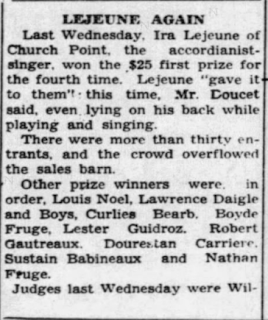Eh, ye yaille, malheureuse,Tout les jours dans ma maison,J'après, mais, t'espérer,Eh, rappelle-toi, catin,Ton papa et ta maman t'a toujours dit,De pas faire ça avec ton nègre.Eh, ye yaille, tout les jours,Après souffert dans ma maison,Plus personne que vient me rejoindre,Oh, ça me ressemble,'Tite fille, tout les jours tu connais,Pour venir puis voir,Quoi faire que, moi, j'suis là?Eh, bébé, tout les jours,Moi, j'suis là sur ma galerie,Après espérer, pour ton vieux nègre,Oh, tu devrais jamais m'oublier,Tant loin q'moi j'm'en vas te dire,Donc, garde-donc, j'm'ennuie de toi.
 |
| Crowley Daily Signal Feb 9, 1950 |
"Church Point Breakdown" (#1096) was an ode to the town of Church Point, not far from where Iry grew up in Pointe Noire. Iry's relative, Angelas Lejeune, was also a well-known accordionist from Pointe Noire and Iry converted his cousin's tune "Le Petite One Step" into his own. Recorded in 1953 at Iry's home with Milton Vanicor on fiddle and Goldband producer Eddie Shuler on guitar, it's one of the few Iry releases that Eddie pressed solely on 45 RPM. Shuler invited director Drew Ellender for this session. His main function was to let Iry know when to start and stop and he stood behind Iry who was sitting on the floor. Iry's son Ervin Lejeune pointed out that he was sitting on the floor, "probably because daddy had a bad habit of tapping his feet."3
 |
| Daily World Jan 30, 1949 |
Hey, ye yaille, oh my,Everyday in my house,Well, I'm waiting for you,Hey, remember, little doll,Your father and your mother have always told you,Don't do that to your man.Hey, ye yaille, everyday,Suffering in my home,No one comes to meet me,Oh, looks to me that way,Little girl, everyday you know,What is that I'm doing here?Hey, baby, everyday,I am there, on my porch,Waiting, your old man,Oh, you should never forget me,As far as I can tell you,So, look, I am lonesome for you.
It was Angelas who lent Iry his accordion to practice with while he plowed his fields and it was Iry's uncle Steven who gave the future star his first accordion.1 But Angelas wasn't the only family influence on Iry. Many of the Lejeunes from the area between Pointe Noire and Church Pointe were musicians. Iry's father Agness played and Angelas' family were all musicians. When author Andrew Brown was asked to compare Iry's style against Lawrence Walker, he stated:
Iry could play rings around Lawrence Walker. Lawrence could play some good waltzes, but when it comes to two-steps, he couldn't touch Iry Lejeune.2
- "Iry Lejeune rescued traditional Cajun music" by Gene Thibodeaux. The Church Point News. Oct 11, 2008.
- Wilson Granger interview. Andrew Brown. 2005.
- "Iry Lejeune: Wailin the Blues Cajun Style" by Ron Yule
Release Info:
-1 La Valse (Dalse) de Bayou Chene | Goldband G-1096-1
-2 Church Point Breakdown | Goldband G-1096-2
Find:
-1 La Valse (Dalse) de Bayou Chene | Goldband G-1096-1
-2 Church Point Breakdown | Goldband G-1096-2
Find:
The Legendary Iry LeJeune (Goldband, 1991)
Iry Lejeune: Cajun's Greatest: The Definitive Collection (Ace, 2003)


No comments:
Post a Comment
Got info? Pics? Feel free to submit.